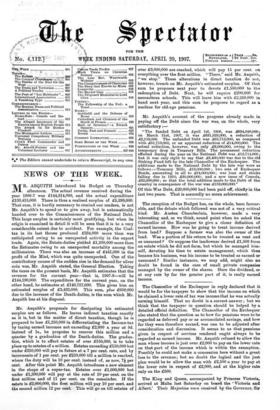The Chancellor of the Exchequer in reply declared that it
would be for the taxpayer to show that the income on which he claimed a lower rate of tax was income that he was actually earning himself. That no doubt is a correct answer ; but we think that the taxpayer in question should be helped by a detailed official definition. The Chancellor of the Exchequer also stated that the question as to how far pensions were to be regarded as deferred pay or as accumulated savings, and bow far they were therefore earned, was one to be adjusted after consideration and discussion. It seems to us that pensions given in respect of services rendered ought always to be regarded as earned income. Mr. Asquith refused to allow the man whose income is just over 22,000 to pay on the lo*er rate on that part of the income which is within the exemption. Possibly he could not make a concession here without a great loss to the revenue; but no doubt the logical and the just plan would be to allow the man with 22,500 a year to pay at the lower rate in respect of 22,000, and at the higher rate only on the £500.










































